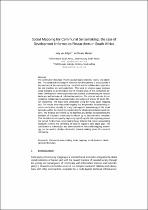 ResearchSpace
ResearchSpace
Social mapping for communal sensemaking and collaboration: the case of development informatics research in South Africa
JavaScript is disabled for your browser. Some features of this site may not work without it.
- ResearchSpace
- →
- Research Publications/Outputs
- →
- Book Chapters
- →
- View Item
| dc.contributor.author |
Van Biljon, J

|
|
| dc.contributor.author |
Marais, Mario A

|
|
| dc.date.accessioned | 2017-07-28T09:36:41Z | |
| dc.date.available | 2017-07-28T09:36:41Z | |
| dc.date.issued | 2017-05 | |
| dc.identifier.citation | Van Biljon, J. and Marais, M.A. 2017. Social mapping for communal sensemaking and collaboration: the case of development informatics research in South Africa. In: Choudrie J., Islam M., Wahid F., et al. (eds). Information and Communication Technologies for Development. ICT4D 2017. IFIP Advances in Information and Communication Technology, vol 504, p. 280-291. DOI: 10.1007/978-3-319-59111-7_24 | en_US |
| dc.identifier.isbn | 978-3-319-59110-0 | |
| dc.identifier.uri | DOI: 10.1007/978-3-319-59111-7_24 | |
| dc.identifier.uri | https://link.springer.com/chapter/10.1007/978-3-319-59111-7_24 | |
| dc.identifier.uri | http://hdl.handle.net/10204/9403 | |
| dc.description | Copyright: 2017 Springer. Due to copyright restrictions, the attached PDF file contains the accepted version of the published item. For access to the published version, kindly consult the publisher's website. | en_US |
| dc.description.abstract | The community dynamics revolve around shared interests, norms, and identities. The sustainable exchange of resources for development is only possible if the members of the community are connected and the collaboration opportunities and practices are well-understood. This work in progress paper proposes social mapping as an innovative way of making sense of the connections between Development Informatics researchers towards understanding the research landscape and behavioural collaboration patterns. The data set includes the associations, collaborations and publication connections of at least 50 South African researchers. The maps were constructed using the Kumu social mapping tool. The results show that social mapping has the potential for presenting research connections visually in a way that supports sensemaking of the social dynamics within the society by considering the structural and behavioural patterns. The findings are limited by the fact that any attempt at representing the members of a dynamic 296community is seldom up to date and never complete. That limitation is managed by rigorously specifying the data capturing process and period. Furthermore, sensemaking theory informs that human sensemaking implicitly involves the unmaking of sense to adjust to time-space gaps. The contribution is a description and demonstration of how social mapping technology can be used to display information towards making sense of a research community. | en_US |
| dc.language.iso | en | en_US |
| dc.publisher | Springer | en_US |
| dc.relation.ispartofseries | Worklist;19162 | |
| dc.subject | Communal sense-making | en_US |
| dc.subject | Social dynamics | en_US |
| dc.subject | Development informatics | en_US |
| dc.subject | Social mapping | en_US |
| dc.title | Social mapping for communal sensemaking and collaboration: the case of development informatics research in South Africa | en_US |
| dc.type | Book Chapter | en_US |
| dc.identifier.apacitation | Van Biljon, J., & Marais, M. A. (2017). Social mapping for communal sensemaking and collaboration: The case of development informatics research in South Africa., <i>Worklist;19162</i> Springer. http://hdl.handle.net/10204/9403 | en_ZA |
| dc.identifier.chicagocitation | Van Biljon, J, and Mario A Marais. "Social mapping for communal sensemaking and collaboration: the case of development informatics research in South Africa" In <i>WORKLIST;19162</i>, n.p.: Springer. 2017. http://hdl.handle.net/10204/9403. | en_ZA |
| dc.identifier.vancouvercitation | Van Biljon J, Marais MA. Social mapping for communal sensemaking and collaboration: the case of development informatics research in South Africa.. Worklist;19162. [place unknown]: Springer; 2017. [cited yyyy month dd]. http://hdl.handle.net/10204/9403. | en_ZA |
| dc.identifier.ris | TY - Book Chapter AU - Van Biljon, J AU - Marais, Mario A AB - The community dynamics revolve around shared interests, norms, and identities. The sustainable exchange of resources for development is only possible if the members of the community are connected and the collaboration opportunities and practices are well-understood. This work in progress paper proposes social mapping as an innovative way of making sense of the connections between Development Informatics researchers towards understanding the research landscape and behavioural collaboration patterns. The data set includes the associations, collaborations and publication connections of at least 50 South African researchers. The maps were constructed using the Kumu social mapping tool. The results show that social mapping has the potential for presenting research connections visually in a way that supports sensemaking of the social dynamics within the society by considering the structural and behavioural patterns. The findings are limited by the fact that any attempt at representing the members of a dynamic 296community is seldom up to date and never complete. That limitation is managed by rigorously specifying the data capturing process and period. Furthermore, sensemaking theory informs that human sensemaking implicitly involves the unmaking of sense to adjust to time-space gaps. The contribution is a description and demonstration of how social mapping technology can be used to display information towards making sense of a research community. DA - 2017-05 DB - ResearchSpace DP - CSIR KW - Communal sense-making KW - Social dynamics KW - Development informatics KW - Social mapping LK - https://researchspace.csir.co.za PY - 2017 SM - 978-3-319-59110-0 T1 - Social mapping for communal sensemaking and collaboration: the case of development informatics research in South Africa TI - Social mapping for communal sensemaking and collaboration: the case of development informatics research in South Africa UR - http://hdl.handle.net/10204/9403 ER - | en_ZA |





